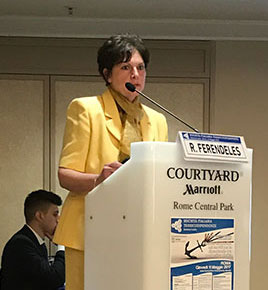On May 11, 2017, Dianova participated in an event organized in Rome (Italy) by the Italian Society on Addiction Research (SITD) and presented the peculiarities of the therapeutic alliance in a residential setting.

The event’s main objective was to examine the various aspects of the therapeutic alliance in such a complex environment as addiction. The event was entitled “Therapeutic alliance in addiction services: a holistic perspective” and was organized by the SITD from the Lazio region in collaboration with the Italian Society for the Treatment of Alcoholism and Complications (SITAC)
Many addiction professionals and other experts came to the Hotel Central Park Courtyard by Marriott in Rome to have practical discussions and exchanges on how the therapeutic alliance can be an important tool for achieving treatment objectives. At the present time the activities of addiction therapeutic communities (TCs) are made increasingly difficult due to conflicting social, economic and clinical aspects. This situation led the SITD Lazio to propose a series of considerations on the therapeutic alliance as a basis for initiating a recovery process that not only takes into account the users themselves, but also family members, practitioners and the services provided.

It is within this context that Dianova Italy‘s representative, Ms Rita Ferendeles, psychologist and supervisor of treatment services at Dianova’s Palombara TC, made a presentation on the specificities of the therapeutic alliance in the residential context.
Dianova’s TCs respond to the complexity of the addiction problem through residential programmes tailored to each person’s needs and grounded in a holistic vision and a person-centred bio-psychosocial approach.
The presentation started with a short historical digression on the change in the intervention model used by TCs: implementation of evaluation processes to have allowed them to adapt and address each individual’s characteristics, professionalization of services, integration of pharmacological therapies, identification of the residential component as a specific element of the treatment network, and implementation of evidence-based methodologies.

Ms Rita Ferendeles also highlighted the concept of the therapeutic alliance in residential facilities at all stages of the treatment process, (between the individual and the therapist/team, within the TC-specific group dynamics, and within the person’s family) and up to the reintegration phase, while she also examined the emotional consequences, inherent in the therapeutic alliance, that may appear both amongst therapists and residents.
In short, the therapeutic alliance in which therapists and residents are moving forward together leads to a partnership that supports the individual’s emancipation towards self-reliance, and towards the maximum level of autonomy he or she can possibly achieve. It is now that the therapist should stop, he should follow the person from afar, provide growth opportunities that were interrupted by addiction. When the residents initiate the reintegration phase, they have to leave the community and they may break the therapeutic alliance built up over time. One should accept that in the reintegration phase, therapists are no longer just that, therapists, with a long relationship with residents. They have become parental from which it is difficult to break away.
To use a metaphor, interventions resemble the myth of the labyrinth and Ariadne’s thread: people need to find their way out of the maze of their addiction problems while the therapist’s task is to help them find their own thread and lead them to the exit.
The presentation was positively received by participants who showed interest, curiosity and appreciation for the quality of Dianova’s programmes in Italy. After the conference, Dianova Italy joined another meeting with SITD Lazio partners, as various of the organization’s representatives are now part of the institution’s regional Board of Directors.
In conclusion, events such as this one are an important step in developing a trusting relationship between services and addiction professionals, to help build a confidence pact that will enable us meet the challenges in addiction services today.
